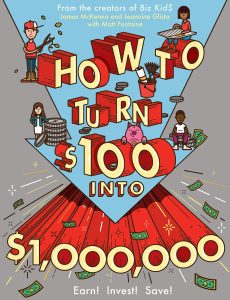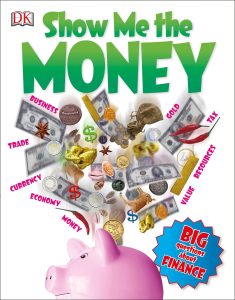The 7 Best Financial Literacy Books for Kids and Teens
Money management is an important life skill that everyone should learn. Unfortunately, many people go through life without ever learning about personal finance. That’s why it’s important to start teaching your kids about money early on. There are a lot of great financial literacy books for kids and teens out there. The 7 books below are some of the best. They cover topics like budgeting, investing, and saving money. They’re also engaging and informative, which makes them perfect for teaching your kids about personal finance. So, if you’re looking for a way to start teaching your kids about money, pick up one of these financial literacy books. Your kids will thank you for it later!
 Due – Due
Due – Due 
National Geographic Kids: Everything Money
This book is a great resource for kids who want to learn about money. National Geographic Kids has always been a go-to for interesting and unique content. Likewise, their take on all things money is no different. Though it may lean more towards being a reference book on currency, it’s a great starting point for any kids who are interested in the subject of money. The photography in Everything Money is gorgeous as always, and the facts are presented in a clever way that makes them easy to understand.

Real World Money Lessons for Kids & Teens
At its core, this digital book is about empowering kids with the knowledge they need to succeed in the real world. As parents, we want to give our children the best possible chance at success in life. Part of that involves teaching them about money. Unfortunately, most schools do not place a great emphasis on financial education. This book seeks to fill that gap.
In Real World Money Lessons for Kids and Teens, your children will learn about the origins of money, the capitalist system, how to budget and invest, and the importance of giving back. By providing a well-rounded education on financial matters, we empower our children to make sound decisions with their money and set them on the path to a bright future. And if you want even more outstanding financial literacy and entrepreneurial content for kids, including a fun, interactive, gamified learning experience that kids love, check out Kidpreneurs Academy.

Investing for Kids – How to Save, Invest, and Grow Money
This book is more advanced than some on our list, skipping over the basics of money management and instead focusing on investing. The authors of Investing for Kids also include profiles of famous investors and recaps of historical financial events, making it a great choice for any kid who wants to learn more about the topic of investing money.

How to Turn $100 into $1,000,000: Earn! Save! Invest!
For kids who want to learn about money, How to Turn $100 into $1,000,000 is an excellent book. You’ll find out how to make your money work for you, so you can be on the road to becoming a millionaire. This book introduces you to finance and shows you how to set financial goals. This book will also teach you how to make a budget, get a job, start a business, and invest smartly. You’ll also learn how to think like a millionaire. Plus, there are bonus materials included, like a one-page business plan template, a two-page plan to become a millionaire, and a personal budget tracker.

Show Me the Money: Big Questions About Finance
This unique book, Show Me the Money, takes a holistic approach by introducing a youthful reading audience to the economics world. This book explores personal finance, business, the history of trade, and economics. It also reviews current questions of morals, including fair trade, the impact of business on the environment, free trade, and the debt in the developing world. Additionally, this book also features leading masterminds, like John Maynard Keynes and Adam Smith, to give readers a well-rounded understanding of the economy on a global level.

Make Your Kid a Money Genius (even if you’re not)
This book is a great read for any parent who wants to ensure that their children have a solid foundation in money management. The author of Make Your Kid a Money Genius, Beth Kobliner, breaks money down into concepts that are easy for both parents and children to understand, and she provides practical advice for parents who want to ensure their kids grow up to be financially responsible adults. She talks about the importance of instilling values in your children, like delayed gratification, hard work, and living within your means. She shows how these values will not only help them succeed financially, but also in life in general.

Dollars & Sense: A Kid’s Guide to Using – Not Losing – Money
It may seem strange that something so small can have such a big hold on us. But, that’s the way money is. Money is essential for living, but it doesn’t come with an instruction manual. People typically learn about it through experience by means of trial and error, which can be costly. That’s why Dollars & Sense: A Kid’s Guide to Using – Not Losing – Money is such an important book. It’s full of information on the historical background of money and how our economy functions. It also discusses how people make meaningful personal finance decisions. The book also includes sidebars, diagrams, timelines, a glossary, and additional resources. Additionally, this book includes information on other relevant topics, like the Great Recession and sequestration.
Each of these books has something valuable to offer when it comes to financial literacy and each one offers something unique and important when it comes to kids and money. Whether you’re looking for a book that will teach your kids the basics of financial literacy, a book that will inspire them to take control of their finances, or a book that will provide your children with a step-by-step plan for getting their finances in order; this list of the best financial literacy books for kids and teens has you covered.
Which one is your favorite? Do you have an excellent financial literacy book for kids to add to the list? Drop the details in a comment below!
The post The 7 Best Financial Literacy Books for Kids and Teens appeared first on Due.
https://www.entrepreneur.com/article/427055